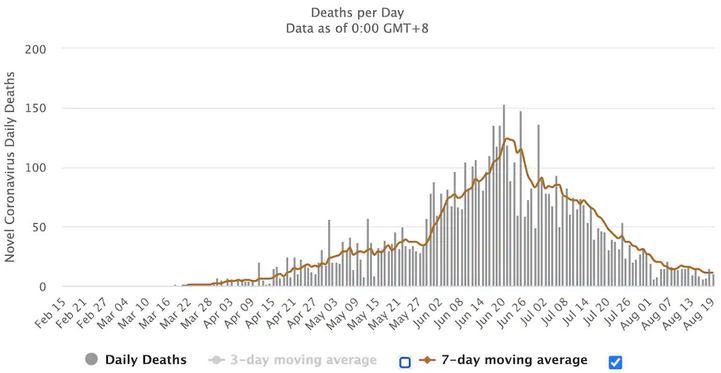Scientists mull mystery of Pakistan s falling coronavirus death rate
A young population, robust immune systems and “smart” lockdowns may explain the fall but health officials remain cautious and uncertain
August 21, 2020 11:42 AM

Two months after Pakistan appeared headed for a sky-rocketing Covid-19 outbreak, case numbers and death toll have fallen in what doctors say is a welcome, but puzzling drop in the disease, reported daily Telegraph.
While neighbouring India has raced up the world ranking for countries badly hit by the new coronavirus, Pakistan is heading in the other direction.
A young population, robust immune systems and a system of localised “smart” lockdowns have all been touted as reasons for the fall, but health officials admit the reasons remain unclear.
In mid-June the daily death toll was pushing 150, and the outbreak was predicted to continue rising until at least August as lax social distancing during May's Eid holidays fed into a boom in cases. Senior officials were privately predicting the start of August was “not looking good” as oxygen supplies ran low and wards filled.
Instead recorded deaths fell sharply and now hover around 10 per day. The daily tally of cases has fallen from more than 6,000 each day to well below 1,000 and restaurants have reopened as remaining lockdown precautions have been lifted. Pakistan has recorded a total of 290,000 cases and 6,200 deaths.

Officials leading the government's response say it is too early to declare victory, and admit the reasons behind the fall are not fully understood.
“One ought to have a little humility in this,” said Dr Faisal Sultan, an infectious diseases expert who worked as Prime Minister Imran Khan's adviser for Covid-19. “There are always great unknowns in science and epidemiology and complex social sciences and interactions. If anyone says they really know a final answer, they are wrong.”
The fall in recorded cases was at first met with widespread scepticism because it coincided with a fall in testing. International officials complained the reduction in tests meant it was impossible to track the spread, while opposition parties accused Mr Khan's government of fiddling testing rates to deliberately hide the prevalence of the disease.
There was also concern that stigma from the disease and the prospect of enforced quarantine made potential patients reluctant to come forward for testing.
Pakistan is still only testing around 0.1 people per thousand, compared to six times that in India. Yet other measures, including the proportion of tests registering positive as well as hospital admissions have also fallen.
“The situation now is not like June where we knew if testing was more, we could have recorded more cases,” said one international official helping the response in Pakistan.
“Now, the positivity rate at the same rate of testing is much much lower confirming a very reduced rate of transmission.
“We have a bit of an unexplained situation,” the official said.
Pakistan's official toll is thought to be a significant overall undercount, and some sick may still be avoiding hospitals, but the downward trend still appeared genuine, officials said.
Pakistan's young population has been suggested as one reason, with young people known to be less severely affected and two-thirds of Pakistan's population younger than 30. Robust immune systems spurred by regular immunisations, or poor sanitation have also been suggested.
Dr Faisal Mahmood, an associate professor of infectious diseases at the Aga Khan University, said he thought the fall in cases was real, “but the reasons for this are not terribly clear at this point”.
“I think it's a little bit of many things. Part of it is we are just lucky and the age distribution of the country is such that we were expected to have as many severe cases as you would expect in say the US, or Italy or the UK.”
Pakistan may have benefited from its outbreak getting going later, when hard lessons on how to treat patients and save lives had already been learned, he said.
The surge in cases after May's Eid celebrations may also have saturated small, mobile super-spreading groups that were then unable to infect others as they recovered and gained immunity.
Dr Sultan said the decision to join up the different provincial responses into a national coordination centre set up with extensive military help, may have made the difference. The set-up allowed officials to get accurate data from the provinces and then act on it, he said.
Pakistan's government has also hailed its smart-lockdown system of localised shutdowns which avoided a lengthy national hibernation. Neighbourhoods were supposed to be sealed up when cases rose above a certain level. But here too, their effect is unclear. There were widespread reports of people able to move freely in and out of supposedly sealed areas.
Dr Sultan said despite the promising signs, he remained cautious.
“At the end of the day I keep reminding people that this is like smouldering embers and the embers are there. You provide them with fuel and with a little bit of oxygen, they will flare up,” he said.






 Public Holiday announced in Lahore tomorrow
Public Holiday announced in Lahore tomorrow Hina Rizvi ties the knot with Ammar Ahmed Khan
Hina Rizvi ties the knot with Ammar Ahmed Khan Police claim girl seen in sub-inspector’s video was his second wife
Police claim girl seen in sub-inspector’s video was his second wife Complete results: PML-N sweeps by-elections as PTI-SIC remains empty-handed in Punjab
Complete results: PML-N sweeps by-elections as PTI-SIC remains empty-handed in Punjab Iranian First Lady visits Numl
Iranian First Lady visits Numl Nazish Jahangir to hit any marriage proposal from Babar Azam out of the ground
Nazish Jahangir to hit any marriage proposal from Babar Azam out of the ground




